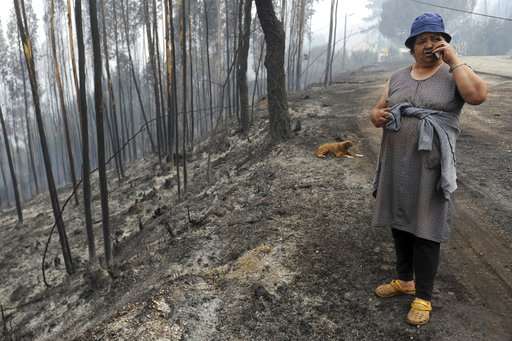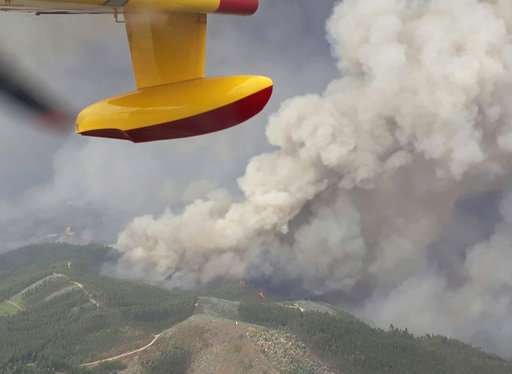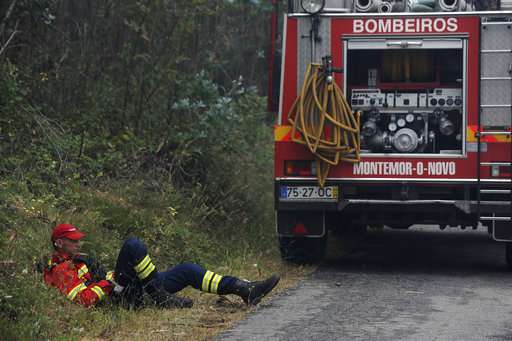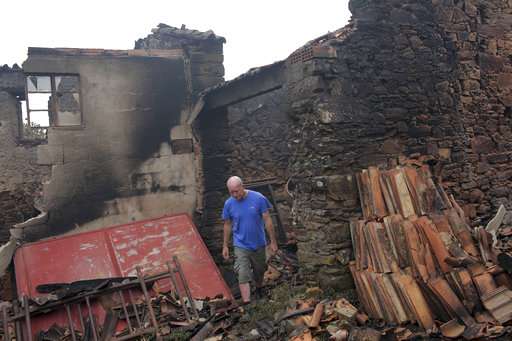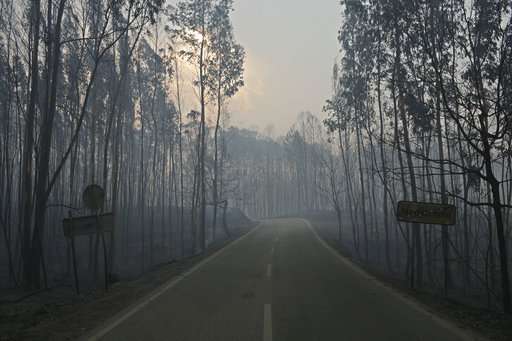Zulmira, 56, talks to her daughter on a mobile phone by the side of a burnt road in Casal de Alge, outside the village of Figueiro dos Vinhos central Portugal, Monday, June 19, 2017. More than 2,000 firefighters in Portugal battled Monday to contain major wildfires in the central region of the country, where one blaze killed 62 people, while authorities came under mounting criticism for not doing more to prevent the tragedy. (AP Photo/Paulo Duarte)
As the temperature began to soar across the Iberian peninsula last week, everyone knew it was only a matter of time before fires started—they've become a summer fixture. But this time they came with a vengeance, one in Pedrogao Grande in north central Portugal killing 62 people—the country's worst forest fire tragedy on record.
Here's a look at why Portugal seems helplessly prone to the phenomenon and what lessons it might be able to learn.
___
WHY IS PORTUGAL SO HARD HIT?
Wildfires are an annual scourge in Portugal. Between 1993 and 2013, Portugal recorded more forest fires than Spain, France, Italy or Greece, according to a report last year by the European Environment Agency, even though it is smaller than any of those countries.
The reasons why are many. Located on Europe's western edge, it is a slender strip of country facing the Atlantic Ocean to the west and Spain to the north and east. It is often subject to forceful winds and inland temperatures sometimes hovering around 40 degrees Celsius, (104 Fahrenheit).
Large areas of central and northern Portugal are covered in dense woodland and hilly terrain, much of it pine and eucalyptus trees, both of which burn well. The forest industry, especially the production of paper pulp, accounts for around 3 percent of GDP, but ecologists lambast authorities for permitting excessive planting of eucalyptus in particular. It is the country's most common and most profitable species—but one that can turn into a veritable tinderbox in adverse conditions.
A government study between 2003 and 2013 found most of the fires are started deliberately set or are due to negligence or accidents.
In this image made available by the Spanish Airforce on Sunday June 18, 2017, a Spanish firefighting plane flies over the fires in Pedrogao Grande, Portugal. More than 2,000 firefighters in Portugal battled Monday to contain major wildfires in the central region of the country, where one blaze killed 62 people, while authorities came under mounting criticism for not doing more to prevent the tragedy. (Spanish Airforce via AP)
___
WHAT IS A DRY THUNDERSTORM?
The Pedrogao Grande catastrophe is believed to have been initially caused by a dry thunderstorm, an environmental phenomenon blamed for starting wildfires worldwide. In it, falling rain evaporates before reaching the ground because of high temperatures, but lightning from the high cumulonimbus clouds reaches the ground. With no rain to wet the land, fires start and are fanned more quickly by gusty winds.
Portuguese police detectives said forestry guards and investigators were able to determine the tree struck by lightning on Saturday during the dry thunderstorm in the Pedrogao Grande area. The tree was in the village of Escalos Fundeiros, said police chief Almeida Rodrigues.
The regional prosecutor has ordered a criminal investigation into the fire's causes but the probe could be dropped if the police version is fully confirmed.
___
CLIMATE CHANGE OR ECONOMIC CUTBACKS?
Portugal endured a three-year recession after needing a 78 billion-euro ($83 billion) international bailout in 2011. The crisis, although officially over, forced cutbacks in virtually all areas of government. Forest management was no exception, with less money for preventive measures such as forest cleaning.
A firefighter from Montemor-o-Novo, southern Portugal, takes a rest by the side of a road in Aguda, outside the village of Figueiro dos Vinhos central Portugal, Monday, June 19, 2017. More than 2,000 firefighters in Portugal battled Monday to contain major wildfires in the central region of the country, where one blaze killed 62 people, while authorities came under mounting criticism for not doing more to prevent the tragedy. (AP Photo/Paulo Duarte)
But global climate change is also emerging as a factor. Ecologists say southern Europe, like many other parts of the world, is experiencing longer and hotter summers and shorter and drier winters. Greenpeace says this is the hottest start to summer in 40 years.
The European Environment Agency report last December said climate change was "expected to have a strong impact on forest fire regimes in Europe."
"Although most of the wildfires in Europe are ignited by humans (either accidentally or intentionally), it is widely recognized that weather conditions and the accumulation of fuel play dominant roles in affecting the changes in fire risk over time," it said.
___
IS PORTUGAL EQUIPPED TO HANDLE BIG FIRES?
Portugal has lots of experience but seems short on equipment and finances. The country has water-carrying firefighting aircraft but not enough to manage major outbreaks like this weekend. It hires aircraft from private companies or relies on the European Union's sharing program under which neighboring countries such as Spain, France and Italy send in aircraft when they can.
The government last March approved a long-term plan to improve forest management and help prevent wildfires that included restrictions on eucalyptus, hiring more firefighters and providing them with better equipment. But critics say many of the reforms have not to come into force or fall short of what is required.
Green lobby groups say governments haven't done enough prevention work, such as implementing early annual forest-cleaning programs, clearing trees from around houses and roads, creating firebreaks in forests and forcing landowners to clean their properties of debris and waste that provides fuel for fires.
British citizen Daniel Starling walks among the debris of his burnt house in the village of Figueira, near Pedrogao Grande, central Portugal, Monday, June 19 2017. Raging forest fires in central Portugal killed tens of people, many of them trapped in their cars as flames swept over roads Saturday evening. (AP Photo/Armando Franca),
"In Portugal, the main factor in the scale of wildfires is the unbroken stretches of forest," said Prof. Paulo Fernandes, a forest researcher at Portugal's Tras-os-Montes e Alto Douro University.
Ideally, he said, there should be firebreaks such as cleared woodland or farmland that help to stop a blaze in its tracks.
In 2015 and 2016, Portugal had some 50 firefighting aircraft at its disposal, most of them rented. But on Saturday five major fires broke out, stretching the country's capacity beyond limits and forcing it to seek help from abroad. More than 2,000 firefighters and soldiers worked to combat the blazes.
___
WHAT CAN PORTUGAL DO?
Cathelijne Stoof, an environmental science professor at the Netherlands' Wageningen University, said Portugal's wildfire problems stem basically from the gradual depopulation of rural areas in recent decades, leaving fewer people caring for forest areas and the countryside in general. She said that, in addition, the country had moved from cooler and damper oak forests in many parts to more commercially viable but fire-hazardous pine and eucalyptus.
"Portugal knows exactly what it needs to do, and that is the sad thing about the current situation," Stoof told the Associated Press. She pointed out that a government forest fire prevention report 10 years ago was deemed to be too ambitious and many of its recommendations ignored.
She maintains there is a lack of control over who owns and is responsible for maintaining many land plots in Portugal.
Burnt trees stand enveloped in smoke on the road leading to the village of Nodeirinho, near Pedrogao Grande, central Portugal, Monday, June 19 2017. More than 2,000 firefighters in Portugal battled Monday to contain major wildfires in the central region of the country, where one blaze killed 62 people, while authorities came under mounting criticism for not doing more to prevent the tragedy.(AP Photo/Armando Franca),
Portugal "has to manage the fuel (fire-feeding vegetation) in the landscape," she said, adding that much vegetation, such as bushes and shrubs, needs to be removed or cleaned up to prevent the fires from spreading fast, and for this, the landowners must be involved.
___
RECORD DEATH TOLL
Pedrogao is by far the worst fire to hit Portugal in terms of victims. In comparison, last year fires across Portugal killed four people, including three on the island of Madeira. The worst previous loss of life was in 1966, when 25 Portuguese soldiers died fighting wildfires.
© 2017 The Associated Press. All rights reserved.
